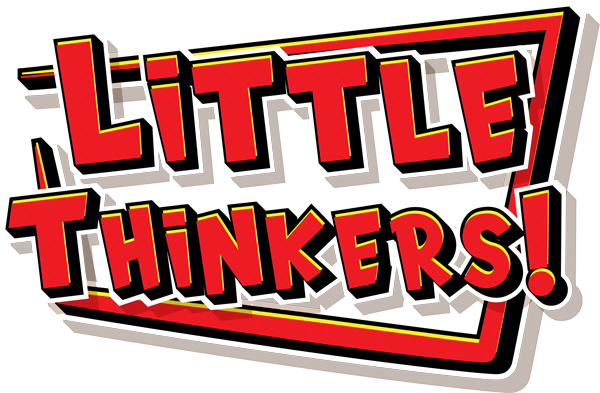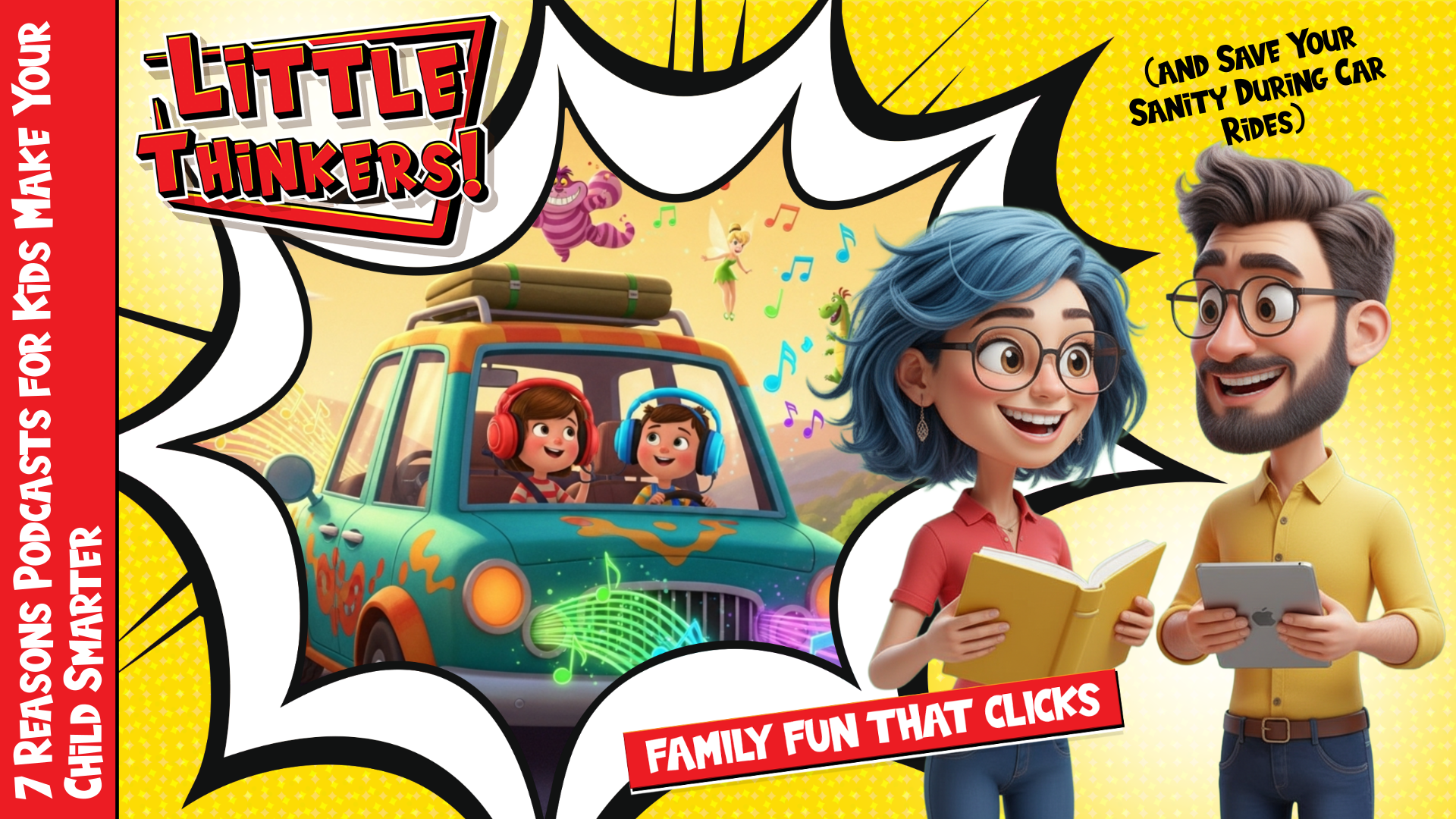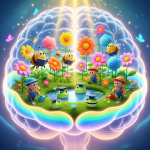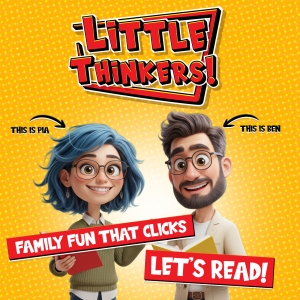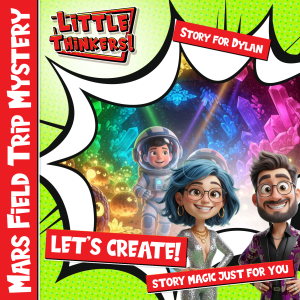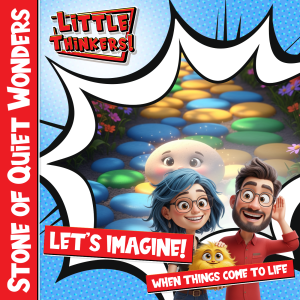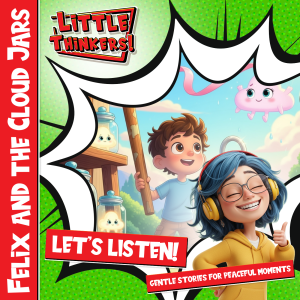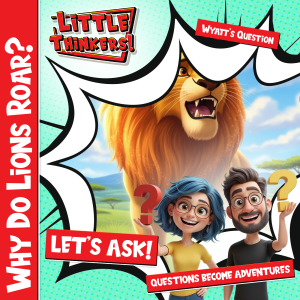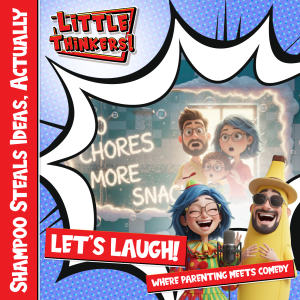The Great Discovery: Your Child’s Brain on Audio Adventures
Picture this: It’s 3 PM on a Tuesday, you’re stuck in traffic with two energetic kids in the backseat, and someone just asked “Are we there yet?” for the fifteenth time. Sound familiar? Well, what if I told you there’s a magical solution that doesn’t involve screen time, sugar, or questionable parenting choices? Enter podcasts for kids – the unsung heroes of modern parenting!
Now, before you roll your eyes and think “Oh great, another thing I need to research,” let me stop you right there. I’m talking about something so simple, so brilliant, that it makes you wonder why nobody thought of it sooner. Actually, they did – we just got so caught up in flashy apps and expensive educational toys that we forgot about the power of good old-fashioned storytelling with a modern twist.
What Exactly Are These Miraculous Audio Wonders?
Podcasts for kids are essentially radio shows designed specifically for young listeners, but without the annoying commercials for products you definitely don’t need. Think of them as bedtime stories that your child can listen to anytime, anywhere – minus the part where you have to do funny voices after a long day at work. They come in all shapes and sizes: educational shows that sneak learning into entertainment, adventure stories that transport kids to magical worlds, and even programs that answer those impossible questions like “Why is the sky blue?” and “Where do babies come from?” (though thankfully, most stick to the sky question).
The beauty of these audio programs lies in their simplicity. No screens to break, no pieces to lose under the couch, no batteries to die at the worst possible moment. Just pure, concentrated storytelling that somehow manages to capture your child’s attention better than that expensive tablet you bought last Christmas.
The Secret Sauce Behind Audio Learning
Here’s where it gets interesting – and slightly nerdy, but in a good way. When children listen to audio content, their brains work differently than when they’re watching videos or playing games. They have to use their imagination to create mental pictures, follow along with storylines without visual cues, and really focus on what they’re hearing. It’s like a workout for their brain, except they actually enjoy it!
Parent Reality Check
- No more fighting over screen time limits
- Something educational that doesn’t feel like homework
- Content that works in the car, at bedtime, or during quiet time
- Finally, an activity that doesn’t create more mess to clean up
But here’s the real kicker – while your kids are having fun listening to stories about talking animals or space adventures, they’re actually developing crucial cognitive skills. Their vocabulary is expanding, their attention span is growing, and their ability to visualize and imagine is getting stronger. It’s like sneaking vegetables into mac and cheese, except with brain development instead of nutrition!
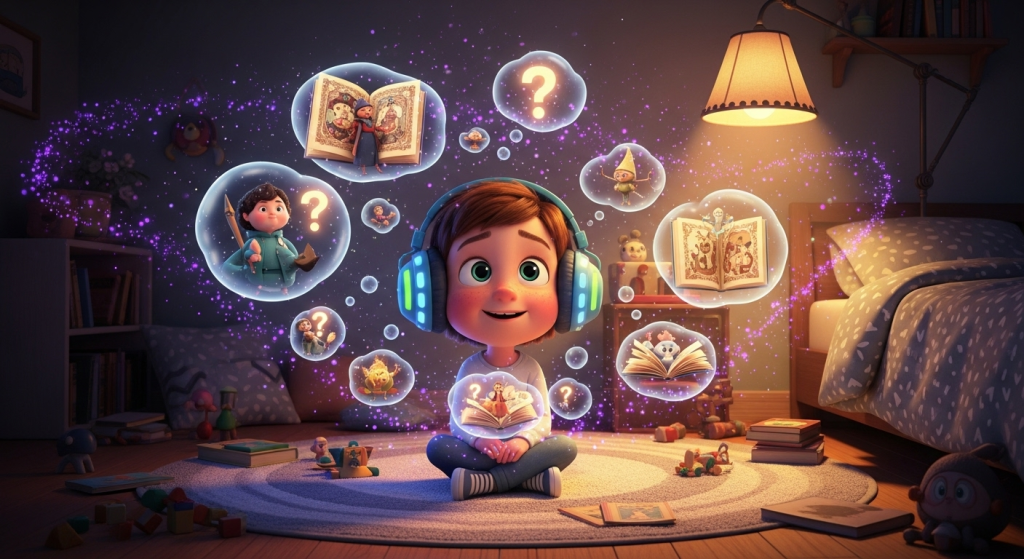
The Science Behind the Magic (Don’t Worry, We’ll Keep It Fun)
Now, let’s dive into the fascinating world of how podcasts for kids actually work their magic on developing minds. And before you start worrying that this is going to turn into a boring lecture, remember – we’re talking about the same medium that convinced millions of kids that a mouse wearing pants could run a theme park.
Brain Development Through Listening
Research shows that when children engage with audio-based learning experiences, they activate different neural pathways than they do with visual media. Think of it this way: when kids watch TV, their brain is like a passenger in a car – everything is shown to them. But when they listen to podcasts, their brain becomes the driver, actively creating mental images and filling in the gaps with imagination.
This process strengthens what scientists call “executive function” – basically, the brain’s ability to focus, remember information, and think flexibly. It’s like CrossFit for the mind, except your child won’t complain about being sore the next day. Studies have found that children who regularly engage with audio storytelling show improved concentration, better memory retention, and enhanced creative thinking skills.
Language Development at Lightning Speed
Here’s something that might surprise you: kids who listen to podcasts often have larger vocabularies than their peers who don’t. Why? Because audio programming exposes them to rich, varied language in context. Instead of learning words from flashcards (boring!), they hear them used naturally in stories and conversations.
The Vocabulary Explosion Effect
- Exposure to 50% more complex words than typical daily conversation
- Context clues help children understand meaning naturally
- Proper pronunciation modeled by professional narrators
- Repetition across episodes reinforces new vocabulary
But it’s not just about learning big words to impress relatives at family gatherings. This expanded vocabulary translates into better reading comprehension, more confident communication, and improved academic performance across all subjects. It’s like giving your child a linguistic superpower, minus the cape and the dramatic origin story.
Attention Span: The Modern Miracle
In an age where everything seems designed to grab attention for exactly 2.3 seconds, podcasts for kids do something revolutionary – they teach children to focus for extended periods. A typical children’s podcast episode runs anywhere from 15 to 45 minutes, and kids learn to follow along, retain information, and stay engaged throughout.
This isn’t just impressive; it’s practically miraculous in today’s world. While their classmates might struggle to sit still for a 10-minute lesson, podcast-listening kids develop the ability to concentrate for longer periods. This skill transfers beautifully to reading, homework, and yes, even those parent-teacher conferences where your child actually pays attention instead of counting ceiling tiles.
The Focus Factor
- Gradual increase in attention span through engaging content
- Training the brain to process information without visual stimulation
- Improved ability to filter out distractions
- Better listening skills for classroom and home environments
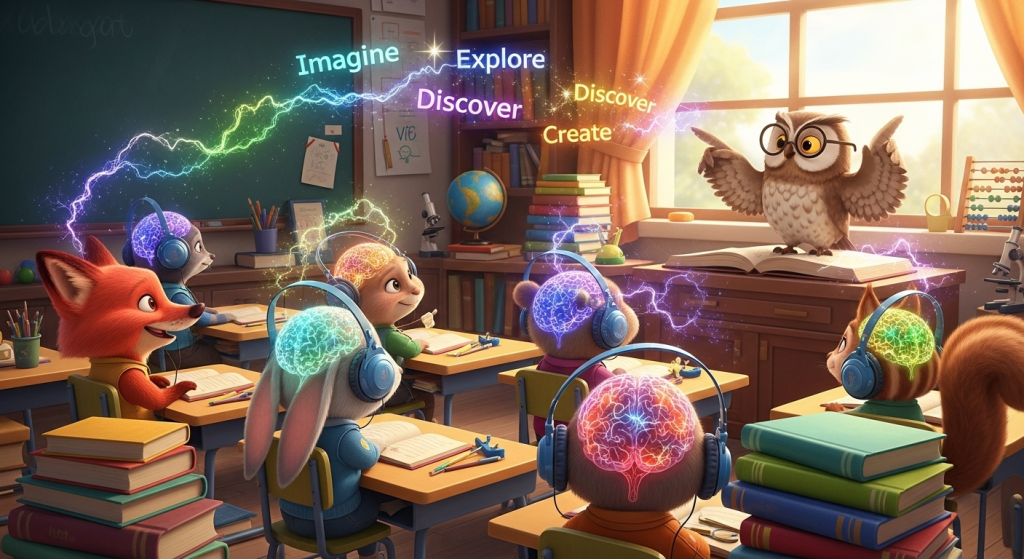
Putting Podcasts to Work: Your Family’s New Secret Weapon
Alright, now that we’ve established that podcasts for kids are basically brain-boosting magic in audio form, let’s talk about how to actually use them in your daily life without adding another item to your already overwhelming to-do list. The good news? This might be the easiest parenting win you’ll ever achieve.
The Art of Perfect Timing
The beauty of podcasts lies in their flexibility – they fit into those awkward time slots that every parent knows too well. You know, those moments when your child is too tired for active play but not tired enough for sleep, or when you need 20 minutes of peace to cook dinner without someone asking for a snack every 30 seconds.
Car rides become opportunities for shared listening experiences instead of battles over who gets to choose the music. Bedtime routines transform from negotiations about “just one more story” to peaceful wind-down sessions. Even those dreaded waiting rooms at the doctor’s office become bearable when your child has an audio adventure ready to go.
Perfect Podcast Moments
- Morning routines while getting dressed (surprisingly effective at preventing outfit meltdowns)
- Quiet time after lunch when everyone needs to recharge
- Household chores – yes, kids will actually help while listening to stories
- Long car journeys without the “Are we there yet?” chorus
- Bedtime when you’re too exhausted to read dramatically
Creating a Podcast-Friendly Environment
Now, let’s address the elephant in the room – getting your kids actually excited about listening instead of watching. The trick is presentation and choice. Start by letting them pick from a few pre-approved options. Kids love feeling like they have control, even if you’ve carefully curated their choices like a sneaky content curator.
Create a special “listening spot” with comfy pillows or bean bags. Some families even have special headphones that are just for podcast time, making it feel like a treat rather than an alternative to screen time. The goal is to make audio time feel special and chosen, not like a consolation prize.
The Integration Strategy That Actually Works
Here’s where parent strategy comes in handy. Instead of presenting podcasts as “educational time” (which immediately makes kids suspicious), introduce them as “story time” or “adventure time.” Start with short, highly engaging episodes and gradually work up to longer content as their attention spans develop.
Many parents find success with the “family podcast time” approach, where everyone listens together initially. This creates shared experiences and gives you insight into what captures your child’s imagination. Plus, you might find yourself genuinely entertained – some of these shows are surprisingly clever and engaging for adults too.
Weekly Podcast Schedule That Works
- Monday Morning: Start the week with an educational adventure show
- Wednesday Wind-down: Calming stories after busy school days
- Friday Fun: Comedy or music-based shows for weekend mood
- Weekend Flexibility: Let kids choose from approved favorites
- Bedtime Consistency: Same gentle format for routine building
Troubleshooting Common Challenges
Of course, not every child immediately embraces podcast listening, and that’s perfectly normal. Some kids are visual learners who initially resist audio-only content. The key is patience and creative problem-solving. Try starting with shows that include music or sound effects, which help bridge the gap between visual and audio entertainment.
For wiggly kids who can’t sit still, combine podcast time with quiet activities like coloring, building blocks, or even gentle exercise. The goal isn’t to create little statues; it’s to engage their minds while allowing their bodies to move naturally. Some children actually focus better when their hands are busy with simple tasks.
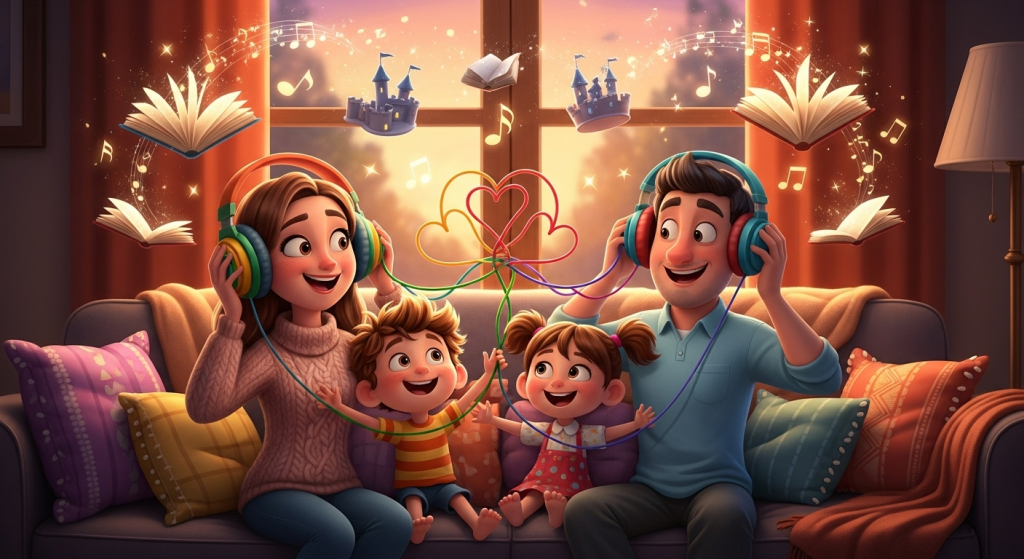
Your Most Pressing Podcast Questions Answered (With Honesty and Humor)
Let’s be real – whenever parents discover something new that might actually help their children’s development, the questions start flowing faster than coffee at a PTA meeting. So let’s address the most common concerns about podcasts for kids with the kind of straight talk that busy parents appreciate.
The FAQ Section Every Parent Needs
“Will my child become antisocial from listening alone?”
Not unless you lock them in a room with nothing but a pair of headphones! Podcasts actually enhance social skills by exposing kids to different perspectives, conversation styles, and social situations. Many children become better conversationalists because they’ve heard so many examples of engaging dialogue. Plus, shared podcast experiences create wonderful bonding opportunities and discussion topics for families.
“How do I know if the content is actually educational?”
Look for shows that encourage critical thinking, introduce new vocabulary naturally, or explore interesting topics in depth. The best educational podcasts don’t feel like school – they feel like interesting conversations with knowledgeable friends. If your child starts asking thoughtful questions or sharing fascinating facts at dinner, you’ll know it’s working. Trust your instincts and your child’s engagement level.
“My kid has ADHD – will podcasts actually help with focus?”
Many parents of children with ADHD report positive results with podcasts, especially when combined with fidget toys or quiet activities. The key is finding the right content length and engagement level. Start with shorter episodes (10-15 minutes) and highly engaging content. Some children with attention challenges actually focus better on audio content because it eliminates visual distractions.
“Are podcasts just a lazy parenting substitute for real interaction?”
Absolutely not! Quality podcasts complement rather than replace family interaction. They provide conversation starters, shared experiences, and topics for deeper discussion. Think of them as tools that enhance your parenting toolkit, like books or educational games. The best part? You can listen together and discuss what you’ve heard, creating meaningful bonding moments.
Making the Most of Your Podcast Journey
As we wrap up this audio adventure, remember that introducing podcasts for kids isn’t about finding the perfect program or following rigid rules. It’s about discovering what captures your child’s imagination and supports their development in a way that fits your family’s lifestyle.
Start small, be patient, and don’t be afraid to try different types of content. Some kids gravitate toward science shows, others prefer fairy tale retellings, and some want nothing but comedy. The beauty of podcasts is that there’s something for every personality and interest level.
Want to explore some amazing philosophical adventures that get kids thinking deeply about life’s big questions? Our podcast episodes are designed to spark curiosity and critical thinking in ways that feel more like play than learning.
Your Next Steps (Because We Know You’re Ready to Start)
Ready to dive into the wonderful world of podcasts for kids? Begin by downloading a few highly-rated shows and testing them during a low-pressure time – maybe a weekend morning when everyone’s relaxed. Let your child help choose from your pre-selected options, and don’t worry if the first few attempts aren’t perfect hits.
Remember, every child who becomes a confident thinker, creative problem-solver, and engaged learner started somewhere. Why not let that somewhere be a cozy listening session that makes everyone’s life a little easier and a lot more interesting?
Ready to Start Your Family’s Audio Adventure?
- Choose 2-3 different podcast types to try this week
- Create a comfortable listening environment
- Start with 15-20 minute episodes to test attention spans
- Ask your child questions about what they heard to gauge engagement
- Share your own favorite moments to create discussion opportunities
And if you’re looking for content that combines entertainment with deep thinking, check out our peaceful listening experiences designed to help children explore big ideas in gentle, engaging ways. Because the best learning happens when kids don’t even realize they’re getting smarter – they’re just having too much fun to notice!
